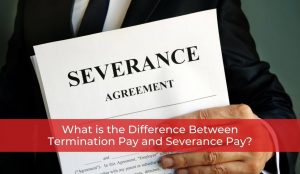Severance Pay Mandatory by Law
Typically, severance pay is given when an employer terminates an employee or in cases of large-scale layoffs. It’s not mandatory by law, and employers may choose to offer severance packages in order to be competitive or for the sake of morale during such challenging workforce transitions. Severance packages can include compensation, extensions of health care and other benefits and outplacement assistance. In addition, severance packages often require employees to waive their right to sue the company for any reason. This is important because it can impact the strength of an employment lawsuit, and an employee should consider carefully whether to waive their rights, particularly if they have a strong claim.
A severance package can include a lump sum payment, or it can be offered over a period of time in installments. Generally, the amount of the severance package depends on how long an employee worked at the company and/or their salary level when they were working there. Sometimes, severance packages also include unused vacation or sick days or stock options that haven’t yet been exercised.
Depending on the situation, some severance packages are taxable. Employers will usually withhold federal income taxes, state income taxes and Social Security taxes, just as they would for a regular paycheck. This is so that the total severance package will be reported on an employee’s W-2 form for the year it was paid.

Is Severance Pay Mandatory by Law?
The legality of severance packages varies from state to state, and there are some states where it’s illegal for employers to give severance packages to fired or laid off employees. However, in some cases, an employer can be legally required to give severance packages to fired employees if they made a promise to them that they would do so. This can be based on an agreement in an employment contract, a promise in an employee handbook or an oral promise by an employer that was made to the employee before they were fired.
For those considering taking a job that includes how to get severance pay, it’s important to research the industry and find out what other companies are offering for similar positions. This can help an employee negotiate a better deal with their employer. It’s also a good idea to talk with an attorney before accepting any severance package. This will help ensure that an employee is making the best decision for their situation and that they are getting what they are entitled to under state and federal law.
Some employers may take a “take it or leave it” approach to severance packages and won’t be willing to negotiate the terms. Others, particularly those that are concerned about potential legal action by former employees, may be more open to discussing the terms and conditions of severance packages. NerdWallet recommends speaking with a knowledgeable employment attorney if you’re considering taking a job that offers severance pay or if you are being laid off from your current employer.